- Home
- Bruce, Leo
Case for Three Detectives Page 5
Case for Three Detectives Read online
Page 5
And he danced back to replace it. As we went downstairs I ventured to ask if he had a theory.
“Not as you might say a theory,” he replied. “All is dark. But see, what is that? A little light! Slowly it grows stronger. And soon Papa Picon sees all. All!” he added, and I hoped he was right.
At last we came to Mary Thurston’s bedroom, and found Sergeant Beef deep in an arm-chair by the window.
“Ah, the good Bœuf!” cried Picon, with a Gallic flippancy which I did not altogether like in the presence of the dead. “On guard, eh? Is it permitted to look about?”
“You can ‘ave a look round,” said the Sergeant. “But nothink’s to be touched, sir.”
“Bien. And what for do you wait so patiently, Sergeant?”
“Me? Oh, I’m just waiting for the warrant to come through. I’ve made my report.”
Picon could not help smiling. “Waiting for the warrant, eh? That is good. You know, then, who is guilty?”
“Course I know. It’s as plain as the nose on your face.”
Picon turned to me. “What is your English expression? He is out for blood, eh?”
It was the Sergeant’s turn to smile. “That’s just about it,” he said.
Picon took some time to examine the contents of that room. And as he did so I thought that his examination was made not because he expected to find evidence there, but because the man was by nature thorough, and would not attach himself to a theory until he had made sure that there was nothing to contradict it.
“And now, Mr. Townsend, will you oblige me a moment? Will you go down to the lounge, turn on the wireless, and return here?”
I began to obey rather unwillingly, wondering what Thurston and the rest of them would think of the sound of music in this house. I made a hasty explanation to Williams, Norris and Strickland, who were in the lounge, and did as Picon had asked.
“Thank you,” he said when I returned. “And now the light grows stronger.”
Thinking that I understood what he meant, I said, “You need have no doubt about our hearing Mrs. Thurston’s scream, Monsieur Picon.”
“You heard that?” he asked slowly.
“Of course I did.”
Then he said an extraordinary thing. “Do not be too sure, M’sieur. The human ear is a curious organ. Sometimes it hears what is not there to hear. And sometimes it fails to hear what is.”
After that, which I interpreted as a piece of deliberate mystification, he too hurried down to the village, probably in search of lunch.
CHAPTER 7
THE gong sounded for lunch, and when I reached the dining-room I was not at all surprised to find that we had been joined by a small human pudding, who was introduced as Monsignor Smith. When he had deposited a number of parcels and hung a green parasol on the back of his chair, he beamed round on us, and refused the soup.
There seemed to be a general, and most understandable, desire to avoid the topic which occupied most of our private thoughts. But perhaps it was some subconscious reversion to his far-fetched ideas of yesterday evening which caused Sam Williams to speak of flying, and the progress of flight, gliding, and the taking of midget aeroplanes.
“Why, I’ve actually heard that an American has risen from the ground and moved through the air with wings,” he said, “and without sharing the fate of Icarus.”
The little cleric was staring out of the window through the thick lenses of his spectacles. “But there are so many kinds of wings,” he murmured; “there are the wings of aeroplanes and of birds. There are angels’ wings, and”—his voice dropped—“there are devils’ wings.” Then he nibbled at a piece of bread which he had been crumbling.
We were silent at once. My acquaintance with all of this remarkable man that had been made public, led me to look for something in his words which would turn out to have some bearing on our problem.
“But there is flight without wings,” he went on, “more terrible than flight with wings. The Zeppelins had no wings to lift them. A bullet has no wings. A skilfully thrown knife, flashing through the air like a drunken comet, is wingless, too.”
This was too pointed for Alec Norris, who began to talk hastily of motor-cars. And because these had little place in Mgr. Smith’s life, his work being done on foot and in places where motor-cars were not welcome, he became silent-again.
Presently the talk was interrupted. Young Strickland made a sudden exclamation, and turned to Stall. “Look!” he said.
A spider had fallen from the ceiling, or from the flowers, and was beginning to crawl across the table. The butler stepped forward, picked it up, and bore it to the window in his fingers. The little round-faced priest beside me was watching him absently. Suddenly he jumped up.
“Oh no!” he cried. “No!” And his voice was plaintive, distressed, and at the same time startled.
He ran across to the window, threw it open, picked up the spider, and dropped it on to the flower-bed.
“Why, whatever’s the matter?” asked Norris. “Didn’t Stall kill it?”
Mgr. Smith paused before answering. Stall had left the room, and closed the door. “I wish he had,” moaned Mgr. Smith. “I only wish he had!”
We exchanged glances. What could he mean? One would not have suspected him of a hatred for spiders, or for anything else for that matter. He was too mild and benevolent to hate. Besides, if it had been hatred for the insect which had made him run across the room, why hadn’t he crushed it? Why had he released it so carefully into the garden?
“Are you a nature-lover, Monsignor Smith? Have you made a special study of the Arachnidæ?”
“If you mean spiders,” he said, “I know only two things about them. And those are the things which everyone knows. They kill flies. And they hang on threads.”
The rest of the meal was rather difficult, for childishly innocent as this man seemed, he had, as I already knew, a knack of saying the most disturbing things.
I began idly wondering as to what unanticipated place he would ask to be conducted when lunch was over, tut even so it was a surprise when he came up to me and asked if I could show him the village church.
I expostulated, of course. “Do you think,” I ventured to ask him, “that we ought to waste time examining an old building while this problem is to be solved? It still presents such difficulties …”
“Yet what can we do with our difficulties better than take them to the Church?” he asked blandly, and we set out.
In the churchyard we met the Vicar. He greeted me with his quick nervous smile, and I introduced Mgr. Smith. The two seemed to have much to talk about, and I agreed to wait while the Vicar showed my new acquaintance the beauties of the old building.
I must have been sitting on the low wall in the pale autumn sunshine for ten minutes, when Mgr. Smith bundled out of the building, evidently under some great stress. His clothes were slightly muddy, I noticed as he came forward, and his thick boots dodged in and out rapidly.
“He called it a wash-basin,” he cried; “there is not a moment to be lost. Don’t you realize he called it a washbasin?”
I was getting so used to this sort of cryptic excitement that I expressed no wonder, but strode beside the breathless little man towards the Thurstons’ house.
“A wash-basin,” he murmured. “His very words.”
Suddenly Mgr. Smith stopped in the centre of the path. “Why!” he said quite loudly, turning his glasses towards me, “why, of course!” After a moment he went on. “We must go to the gymnasium,” he said.
“The gymnasium?”
“Yes. At once. You say one rope has been found?”
“Yes. The rope.”
“One of the ropes,” he replied absently.
“Are there two, then?” I asked, feeling as though I were Alice.
“I’m afraid so. If there was only one, it would be better. It would be much better. But I’m afraid there are two. And yet—who can say? One rope makes a noose.”
The gymnasium had been built
by Thurston’s predecessor, an enthusiast for physical fitness. It stood beside the garage, a long white building. Since it was entirely modern in architecture, and made no attempt to ape the crusted red brick of the house, it had been discreetly set out of sight of even the bedroom windows.
It was not used, nowadays, by the Thurstons themselves, or their friends. None of us were physical culturists. But strolling that way one morning during a previous visit, I had heard some movement in the place, and had looked in to see Fellowes, the chauffeur, in a position on the parallel bars which would have been thougnt impossible to anyone but a contortionist. I had asked him then whether the gymnasium was used at all, and he said that Dr. Thurston allowed the local boy-scout troup to gather there once or twice a week. He, Fellowes, did not like this scheme, because the boys made so much noise, and had been known to run about the grounds afterwards.
When we entered it now it was very silent, and had that empty gloom which haunts schools and churches when no one is in them. One missed the crowd that should have been in that place.
Little Mgr. Smith was gazing up to the roof like an idle shepherd boy watching clouds. And I looked up to see what held his attention. Two hooks, of the reinforced kind used for the fixing of gymnasium apparatus, were in the crossbeam, but no rope hung from them.
“You’re quite right,” I said, “I remember now. There were two ropes. The man who built the place, so Fellowes told me, had them fixed so that he and his friends could have races. And they’re gone.”
Lying along the wall was a ladder.
“Strange place to keep a ladder,” I commented. But Mgr. Smith did not wait to answer. I realized afterwards that he had gathered at a glance that the ladder had been brought in to enable the man who had removed the ropes to get them down.
It was he who led the way into the house, and up the stairs to the second floor—stairs which I was beginning to know too well. He bustled briskly into the apple-room, and scarcely troubling to pull the black cloth from his arm he plunged his hand into the water-tank. A moment later a second rope, similar in every respect to the first, lay dripping beside it on the floor.
Then Mgr. Smith sat himself plumply down on a wooden bench and said nothing for a long, long time. Dusk was already beginning to fall outside, but in the apple-room there was still light enough for me to see his round features, with a look of great and fearful wonder on them. The sun went down in crimson and yellow, like a vast battle between two armies on the hills of Spain.
And presently Mgr. Smith said: “Have you never thought what vile things men have invented for the killing one of another? And to what use they have put inventions already evil, like gunpowder and gas? But neither gunpowder nor gas, neither pistol nor poison, is as terrible as the instrument which this murderer chose.”
“I should have thought it was a very ordinary instrument,” I ventured. “A knife.”
“You are speaking of the weapon, only. I was thinking of more than that.”
“You mean, he had an accomplice?”
“I mean he had seven.”
“Seven,” I almost shouted, for this obscure suggestion startled me.
“Seven devils,” he said, and rocked himself to and fro sadly.
“But, Monsignor Smith,” I said, “what is the distinction between the weapon and the instrument? Surely you are playing with words?”
“That is too perilous a game for me to play. I would sooner amuse boys with a bomb which they think is a ball, than confuse men with a word which they believe is a warning. The instrument may yield the weapon as the guillotine dropped the blade.”
“But then—if you understand it all …”
“But I don’t!” cried Mgr. Smith. “I know the weapon, and I think I know the instrument. But I have yet to be sure of the murderer.”
The apple-room was almost dark now, and I felt that it must be tea-time. I stood up to see whether it would move him. To my relief Mgr. Smith rose too.
“You are right,” he said, “there is evil in this room.”
He seemed to be no longer in a hurry, but thumped downstairs prosaically. As we came into the lounge to join the others I could hear him murmuring softly to himself, and half-turned to catch the words.
“King Bruce, King Bruce,” he was whispering mystically.
CHAPTER 8
IN a deep arm-chair beyond the circle round the tea-table, Lord Simon Plimsoll was extended, with a cigar between his long fingers and a book in his hand.
“Nice copy, this,” he commented; “it’s the Aldine Plato. I’ve never seen the 1513 edition on vellum before. Aldus and Musurus did it together, you know, and dedicated it to Leo X. He was so tickled that he renewed the privileges granted to Aldus by Alexander VI and Julius II. Your friend must be a bit of a collector?”
“I believe he is.”
“Do a bit myself,” said Lord Simon.
I thought this was modest when I remembered some of the books with which his collection had been credited.
“So I have heard. In the meantime I’ve got some news for you.”
He continued to turn over the leaves of his book while I told him of M. Picon’s discovery of the tattoo marks on Fellowes’s forearm.
“Interestin’,” he conceded, “but not very helpful. We want to know who did the murder, not who thought of it.”
Rather disappointed, I tried him with the story of the jewels in Strickland’s bedroom, and the marked newspaper on Fellowes’s table. But to both of these he nodded and said, “Very likely. Very likely.”
It was when I came to the second rope which Mgr. Smith had found that he jumped to his feet.
“Another rope?” he said. “That’s awkward. That throws everything out. Unless …” He paused. “Look here, Townsend, give me a hand, will you? I want to take one of those ropes to the gymnasium.”
Though it meant yet another climb to the second storey, I could not very well refuse. Soon we had dragged the thing across the garden, and Lord Simon, delicately poised on the ladder, had hung it in its original place. He descended, and standing back to the door, looked fixedly at it.
“It’s all right,” he said, as we left the gymnasium. “Quite all right. I might have known it would be.” And he pulled gratefully at his cigar.
The muffins were cold when we got back, but I knew better than to think food was important while there was investigation to be done. Why, I have known people, after murders, to go whole days without eating.
Thurston still had not appeared, but I understood that he was to be present at the enquiry that evening. I was thankful that he had kept out of the way all day. My knowledge of these situations, gathered from some study of them, taught me that we were all behaving according to the very best precedents, but I could not help feeling that a man who had just lost his wife might not see it that way. I had learnt that after a murder it is quite proper and conventional for everyone in the house to join the investigators in this entertaining game of hide-and-seek which seemed wholly to absorb us. It was not extraordinary for there to be three total strangers questioning the servants, or for the police to be treated with smiling patronage, or for the corpse to be pulled about by anyone who was curious to know how it had become a corpse. But when I thought of the man to whom the tragedy would be something more than an entrancing problem for talented investigators, I really wondered how these queer customs had arisen.
All three of our distinguished visitors, I noticed, kept very much to himself, or at least remained at some distance from his rivals. Lord Simon, having satisfied himself that the rope was, as he put it, all right, had settled down again to his Aldine Plato. Mgr. Smith was discussing mediæval art with Alec Norris, and M. Picon, after rearranging the cups which had been laid haphazardly on the tea-table, sat isolated near the fire.
The time had come, I thought, for stock-taking. The three great investigators, not to mention the police sergeant, had all begun to form theories, and since I had as much evidence in my hands as they had, I did
not see why I should not do the same.
However they might differ in the details of their research, they had all been interested in the rope, or two ropes, which had been discovered. Yet I could not see how those ropes could have been used. What made them impossible was that we had been so prompt, so very prompt, in breaking down that door. If the murderer had escaped by climbing a rope he would have murdered Mary Thurston, crossed to the window, climbed out on to the sill, closed the window after him, climbed the rope and drawn it up after him, all during the few moments it had taken us to run upstairs and break down the door, for certainly a rope against that window would have been visible, and probably it would have swung against it noisily. But even if neither was the case I could not believe that the rope could have been drawn up before Sam Williams crossed to the window to look out for it.
And then, even suppose that it could have been, who was there in the house who could have done it? I have explained that before even we had started to break the door down, Norris was with us, and Stall, Strickland and Fellowes had all appeared within a few moments—too few moments for any of them to have climbed a rope, entered by the upper windows and come down to join us. That left only the Vicar, the cook and the parlourmaid as possible rope-climbers. It was safe to exclude the two women from suspicion of this feat. As for the Vicar, we had Stall’s word that he had admitted him some time after the crime. But more final than that was the fact that if he had murdered Mary Thurston and escaped by climbing the rope, he would either have had to climb and enter the upper window as we were coming upstairs and breaking in, or have delayed his climb. In the first of these cases he would certainly have been heard or seen entering the apple-room by Stall and Fellowes, who were on that floor at the time, or his rope would still have been dangling, and he on it, outside the window when Williams had opened it.
No, on the whole, I was inclined to discount the whole of the rope theory. I will concede a great deal to human agility, but not the quickness of action that would have been necessary in this case.

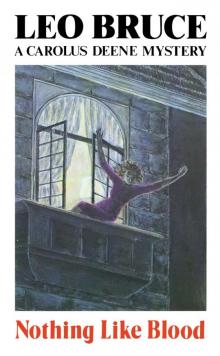 Nothing Like Blood
Nothing Like Blood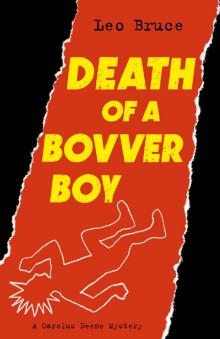 Death of a Bovver Boy
Death of a Bovver Boy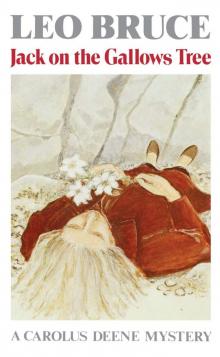 Jack on the Gallows Tree
Jack on the Gallows Tree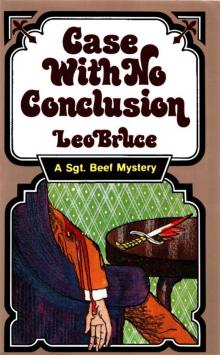 Case with No Conclusion
Case with No Conclusion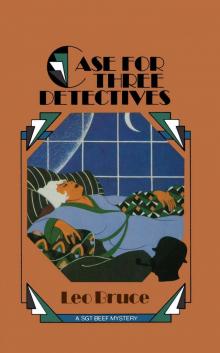 Case for Three Detectives
Case for Three Detectives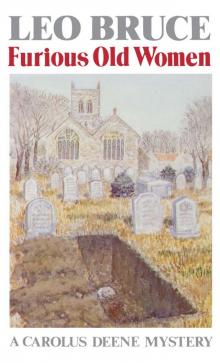 Furious Old Women
Furious Old Women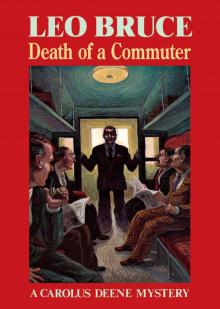 Death of a Commuter
Death of a Commuter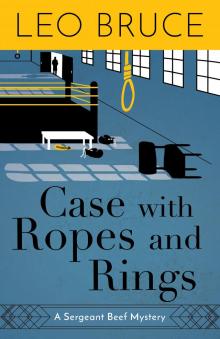 Case with Ropes and Rings
Case with Ropes and Rings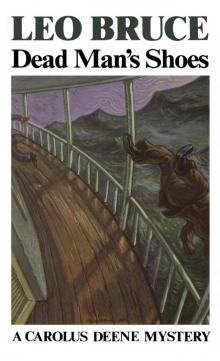 Dead Man’s Shoes
Dead Man’s Shoes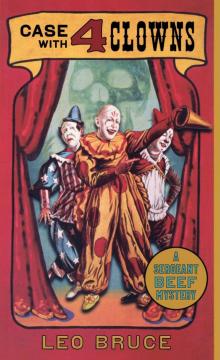 Case with 4 Clowns
Case with 4 Clowns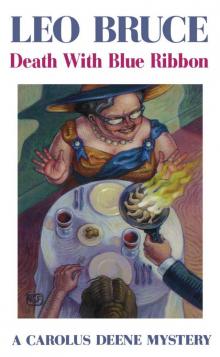 Death with Blue Ribbon
Death with Blue Ribbon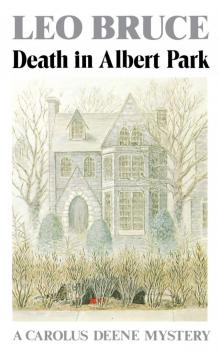 Death in Albert Park
Death in Albert Park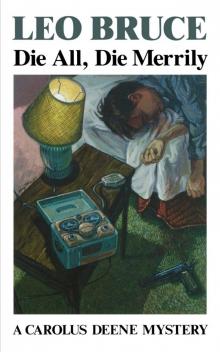 Die All, Die Merrily
Die All, Die Merrily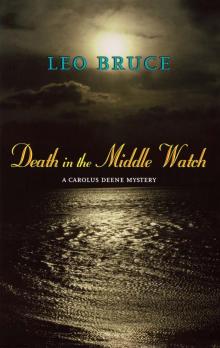 Death in the Middle Watch
Death in the Middle Watch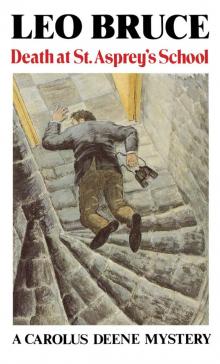 Death at St. Asprey’s School
Death at St. Asprey’s School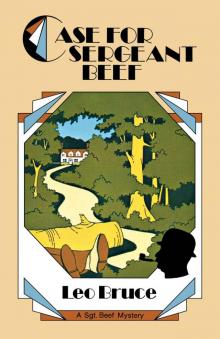 Case for Sergeant Beef
Case for Sergeant Beef